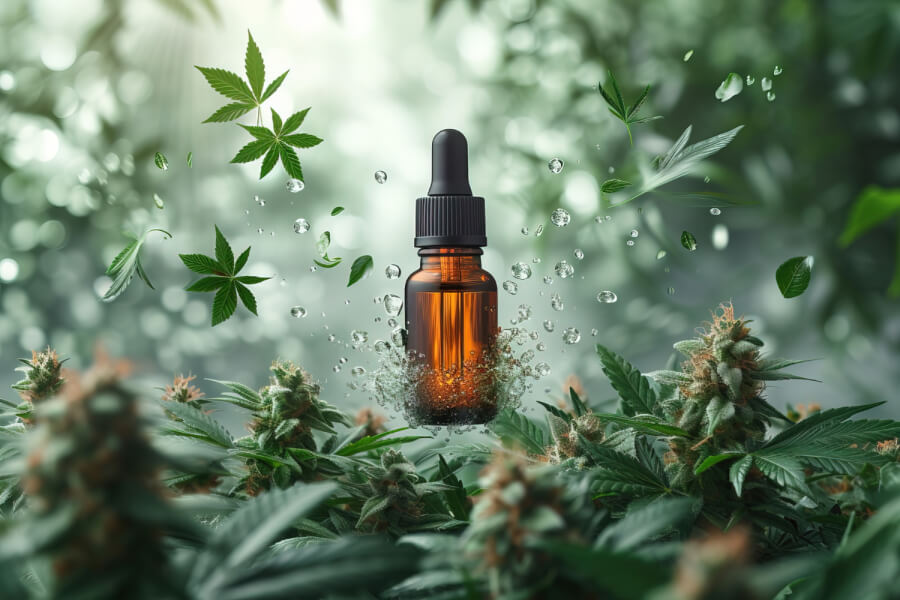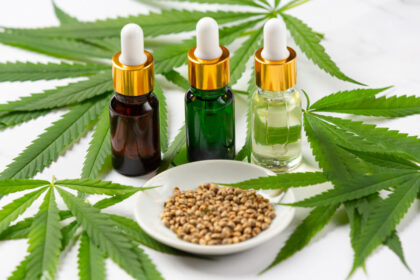Looking for natural relief from various health issues? There’s one remedy gaining lots of attention lately. It is one of over 100 cannabinoids to be identified in cannabis, alongside tetrahydrocannabinol (THC).
It comes from the cannabis plant but doesn’t make you high. People are talking about how it might help with things like pain, anxiety, and trouble sleeping.
It sounds rather promising, doesn’t it? Let’s dive in and see what all the CBD Potentials are about!
Can CBD Help Manage Common Ailments?
Millions of people worldwide struggle with a variety of ailments, from chronic pain and anxiety to sleep disturbances and skin conditions. While traditional medications offer relief, they often come with unwanted side effects. CBD oil, derived from the hemp plant (a cousin of cannabis), presents a natural alternative with a promising safety profile. Studies suggest CBD may play a role in managing:
- Chronic Pain: CBD potentials to interact with the body’s endocannabinoid system, involved in pain regulation, might offer relief for chronic pain conditions like arthritis, migraines, and neuropathic pain.
- Anxiety and Depression: Early research indicates CBD may help manage anxiety and depression by influencing brain chemicals like serotonin.
- Sleep Disorders: Difficulty falling asleep or staying asleep? Studies suggest CBD may promote better sleep by reducing anxiety and promoting relaxation.
- Skin Conditions: CBD’s anti-inflammatory properties might be beneficial for managing acne and other inflammatory skin conditions like eczema and psoriasis.
Exploring the CBD Potentials Oil for Symptom Relief
It’s important to understand that CBD Potentials research is still in its early stages. While promising results exist, more robust studies are needed to fully understand CBD’s effectiveness for specific ailments. However, CBD potentials benefits of oil lie in its ability to:
- Reduce Inflammation: Chronic inflammation is linked to various health issues. CBD’s anti-inflammatory properties might offer relief for conditions like arthritis, inflammatory bowel disease, and even some skin conditions.
- Promote Relaxation: CBD’s interaction with the endocannabinoid system may help reduce anxiety and promote feelings of calm, CBD Potentials help in aiding in sleep regulation and overall well-being.
- Support Overall Wellness: Some studies suggest CBD may offer neuroprotective and antioxidant properties, CBD Potentials help in supporting overall health and potentially contributing to a sense of well-being.
The Science Behind Using CBD for Health Conditions
The human body naturally produces endocannabinoids, molecules similar to those found in cannabis plants. These endocannabinoids interact with cannabinoid receptors throughout the body, influencing various functions like pain perception, mood, and inflammation. CBD, while not directly activating these receptors, is believed to interact with the endocannabinoid system in various ways, potentially influencing these processes and offering symptom relief.
A Natural Approach to Managing Ailments with CBD Potentials
The appeal of CBD oil lies in its natural origin and CBD potentials for fewer side effects compared to some traditional medications. While research is ongoing, early results suggest CBD may offer a safe and effective approach to managing symptoms associated with various ailments.
Important Considerations for Using CBD Oil Safely and Effectively
If you’re considering trying CBD oil, here are some key points to remember:
- Consult Your Doctor: Before incorporating CBD oil into your routine, it’s crucial to speak with your doctor. They can review your medical history and advise if CBD might interact with any medications you’re currently taking.
- Dosage Matters: The optimal dosage of CBD oil varies depending on the intended use and individual factors. Start with a low dose and gradually increase as needed, while closely monitoring how you feel.
- Source Matters: Choose high-quality CBD oil from reputable sources. Look for companies that offer third-party lab testing reports for potency and purity.
- Legality: CBD oil regulations vary by location. Make sure to verify the legal status of CBD oil in your area before purchasing.
Embrace a More Natural Approach to Health Management
While CBD oil isn’t a miracle cure, it represents a promising natural option for managing symptoms associated with various ailments. As research continues to unveil CBD potentials, CBD oil might become a valuable tool for individuals seeking a more natural approach to health management.
FAQs
What is CBD oil, and how does it work in managing ailments?
CBD oil is a natural extract derived from the hemp plant, containing cannabidiol (CBD) as its active ingredient. CBD interacts with the body’s endocannabinoid system, which regulates various physiological processes like pain sensation, mood, appetite, and sleep. By modulating neurotransmitter release and reducing inflammation, CBD may help alleviate symptoms associated with a wide range of ailments.
Can CBD oil make you high?
No, CBD oil cannot make you high. Unlike THC (tetrahydrocannabinol), another cannabinoid found in cannabis, CBD is non-psychoactive. This means that it doesn’t produce the intoxicating effects commonly associated with marijuana use. CBD derived from hemp contains only trace amounts of THC, insufficient to cause any psychoactive effects.
Is CBD oil legal?
The legal status of CBD oil varies depending on factors such as its source (hemp or marijuana) and the laws of the jurisdiction in question. Under the 2018 Farm Bill, CBD generated from hemp containing less than 0.3% THC is permitted at the federal level in the United States. State laws pertaining to CBD may differ, thus it’s important to confirm local rules.
Are there any side effects associated with using CBD oil?
While CBD is generally well-tolerated, some individuals may experience side effects, including dry mouth, diarrhea, changes in appetite, fatigue, and dizziness. These side effects are typically mild and temporary. However, it’s essential to consult with a healthcare professional before using CBD, especially if you have pre-existing medical conditions or are taking medications that may interact with CBD.
How do I determine the right dosage of CBD oil for my needs?
Finding the optimal dosage of CBD oil can vary depending on factors such as body weight, metabolism, the severity of symptoms, and individual sensitivity to CBD. It’s recommended to start with a low dose and gradually increase it until you achieve the desired effects. Keeping a journal to track your CBD usage and its effects can help you determine the right dosage for your needs.
Can I use CBD oil alongside my current medications?
CBD potentials to interact with certain medications, particularly those metabolized by the liver. If you’re taking prescription medications, it’s crucial to consult with a healthcare professional before using CBD to avoid any potential drug interactions. They can provide personalized guidance based on your medical history and medication regimen.





